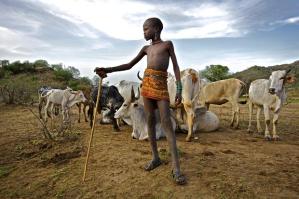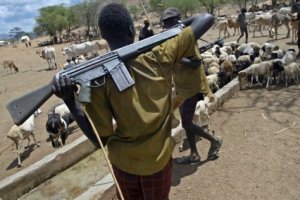 This morning I read a fascinating article published by the Institute for War and Peace Reporting (IWPR) on the continuing problem of cattle rustling endemic of the nomadic pastoralist tribes in rural northwestern Kenya. Violent conflicts over water and grazing rights between the Pokot and Turkana peoples have resulted in countless raids between West Pokot and Turkana counties. For example, in February of this year, one raid in Turkana South resulted in a village being pillaged and destroyed. A number of villagers were killed—including three women and two children—and over 1,200 cattle pilfered.
This morning I read a fascinating article published by the Institute for War and Peace Reporting (IWPR) on the continuing problem of cattle rustling endemic of the nomadic pastoralist tribes in rural northwestern Kenya. Violent conflicts over water and grazing rights between the Pokot and Turkana peoples have resulted in countless raids between West Pokot and Turkana counties. For example, in February of this year, one raid in Turkana South resulted in a village being pillaged and destroyed. A number of villagers were killed—including three women and two children—and over 1,200 cattle pilfered.
This violence has continued unabated for years. In the past, the Kenyan government’s response to this ethnic violence focused mainly on disarmament and taking the offenders to court, but these methods have not stopped the attacks.
However, in response to these more recent attacks, the Kenyan government has partnered with NGOs and the local communities to establish local tribunals where village elders and tribal leaders can mediate this ongoing ethnic dispute. Through the mediation process, led by representatives of the Council of Elders, the Pokot and Turkana people have developed a community-based solution that seems to already enjoy initial successes.
According to IWPR, the tribal leaders force the culprits to confront their victims, compensate them for the killings, and give back stolen livestock. The tribal leaders mete out punishments to the offenders and set the level of compensation they must pay to the families of victims. Furthermore, civic awareness programs are being conducted in the two communities aimed at encouraging a lasting peace.
John Muok, the Chairman of the Pokot Council of Elders, told IWPR:
We needed such a local system, because over the years it has been difficult to implement other strategies aimed at dealing with cattle rustling. Both the government and non-governmental organizations have tried disarmament or introducing alternative means of livelihood for our people, but all that has not worked.
Benjamin Ebenyo, Muok’s Turkana counterpart continued:
Once the communities own the process, then it’s easy to implement, and this mechanism is succeeding because we have so far handled more than 100 cases on both the Pokot and Turkana side with positive results.
 However, as IWPR is quick to argue, mediation alone is not a solution. Human rights advocates like Ken Wafula believe that these localized mediation processes must work in tandem with the Kenyan governments overall disarmament scheme. The proliferation and use of firearms in these attacks has resulted in countless needless deaths as gangs of thugs enter villages and spray bullets in all directions. Even elders are killed in the attacks. Therefore, it seems like the optimal solution is to link government sanctioned disarmament programs with the new local mediation initiative. Time is needed to see how these two approaches work together to bring a positive end to cattle rustling.
However, as IWPR is quick to argue, mediation alone is not a solution. Human rights advocates like Ken Wafula believe that these localized mediation processes must work in tandem with the Kenyan governments overall disarmament scheme. The proliferation and use of firearms in these attacks has resulted in countless needless deaths as gangs of thugs enter villages and spray bullets in all directions. Even elders are killed in the attacks. Therefore, it seems like the optimal solution is to link government sanctioned disarmament programs with the new local mediation initiative. Time is needed to see how these two approaches work together to bring a positive end to cattle rustling.
